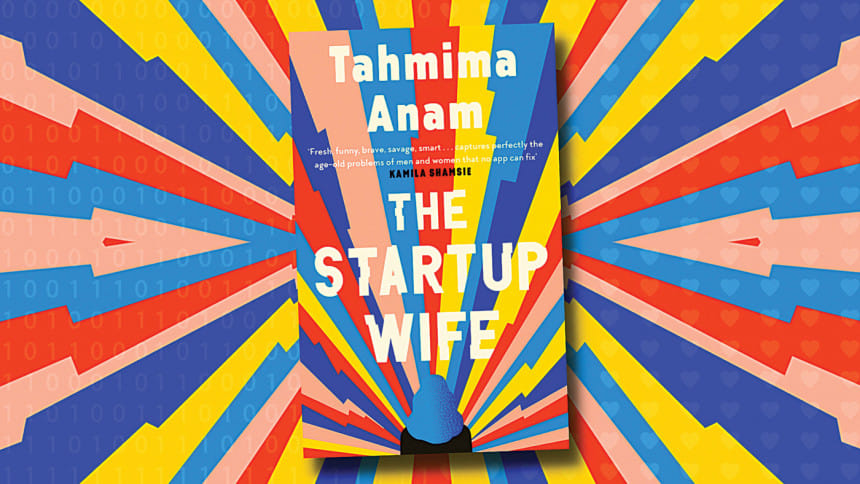Love and feminism in the world of tech

Earlier this week, in a break from work-related correspondence, I sent author Tahmima Anam a personal email. I told her I was writing to her "as a reader" this time, because after months of scarfing down books for the sole purpose of writing reviews, The Startup Wife (Penguin India, 2021) made me forget that I was reading it for work. From the moment I laid eyes on its cheerful cover art and right through to the end—experiencing, along the way, affections and disappointments for its various characters and plot points—I came away with more smiles and tugs on the heart strings than I did notes. Is there anything better to say about a book?
Anam's protagonist in her fourth novel is Asha Ray, born to Bangladeshi immigrant parents in the United States. Early on in the story, Asha skips cheerfully through her childhood in Jackson Heights and her intellectual blossoming—what she calls "step[ping] into my brain like I was putting on a really great pair of sneakers"—in college. She is seen pursuing her PhD by developing an algorithm to inject empathy in robots. When a chance encounter with her high school crush Cyrus brings love, marriage, and inspiration knocking on the door, Asha bundles up her ideas and leaps from academia to the world of entrepreneurship.
Here Asha and Cyrus will make a marriage out of their intellectual pursuits as much as of their personal lives. Cyrus used to personalise rituals for a living. Their social media platform, WAI (We Are Infinite), will draw from Asha's algorithm and Cyrus' ideas to electronically generate rituals for users, based on their unique interests and beliefs. And their partner, Cyrus' longtime best friend Jules, will handle the business end of the operations.
It is this vision that takes the trio to Utopia, a tech incubator where their business will launch and flourish, and where they will plow through episode after nail-biting episode of pitching to investors, correcting bugs, and connecting with hundreds of thousands of users. By the novel's climax, WAI has become a way of life and Cyrus has become something of a cult leader. Asha, retaining with quiet clarity the vision that started it all, has become increasingly sidelined in the firm's success and decision making. Some of it has to do with Cyrus's magnetic personality. A lot of it has to do with the way women are perceived and treated in the tech and startup world.
And so, while the central story is about Asha's slackening grip on her brainchild and her marriage, as an anthropologist Tahmima Anam is interested in how rituals and relationships add meaning to life, and the limits beyond which they can turn destructive. In her debut novel, A Golden Age (Daily Star Books, 2008), this meaning-making happens through the process of war, the slogans, music and personality cults from which war draws energy. In The Good Muslim (2011) this is succeeded by religious fundamentalism.
In The Startup Wife, which is set in the most immediate now, Anam is interested in ideas—how they proliferate our consumerist lives, swelling beyond tangible proportions—and the role played by identities (of gender, race, and past experiences). At Utopia, Asha meets Li Ann, whose app, Spoken, filters out triggering language in emails. Destiny's app Consentify seeks to "unlearn the meaning of seduction" by contractually identifying the body parts users agree to having touched. Marco's platform Obit.ly handles the social media activity of the dead.
The implications of these ideas add weight to an otherwise breezy, cheerful novel whose interior feels like the world of Nancy Meyers's The Intern (2015) and Freeform's TV series, The Bold Type (2017-2021). It is this blend of the light and the powerful that makes the novel such a pleasure to read. While Asha does defer to Cyrus too often, it is an impulse born, among other things, of faith in a loving relationship. She is, otherwise, a witty and confident coder who knows how smart she is. Her sister, Mira, is funnier and stronger still in her newfound motherhood. And their mother, in a rare moment of privacy, offers the advice that, "Marriage is an epic poem. But you are young, and smart, and God gave you some very unique gifts. So I don't think that kind of compromise should be assumed." The presence of such strong women causes the men in the novel to pale in comparison—be it Jules's goof-ball charm, Asha's all but silent father, or even superstar Cyrus, whose magnetism feels more implied than demonstrated.
Years ago, when I first read A Golden Age, Tahmima Anam's writing seemed to be growing stronger with each consecutive sentence in the book, while its follow up novels arrived as more definitively polished end products. The Startup Wife feels polished almost to the point of squeaking—its characters briefly drawn up but memorable, with their flaws and attachments sometimes painfully relatable, and their world a soothing and entertaining refuge from the summer heat.
Tahmima Anam's The Startup Wife (Penguin India, 2021) is available at Baatighar Dhaka, Chattogram, and Sylhet.
Sarah Anjum Bari is editor of Daily Star Books. Reach her at [email protected].

 For all latest news, follow The Daily Star's Google News channel.
For all latest news, follow The Daily Star's Google News channel. 



Comments